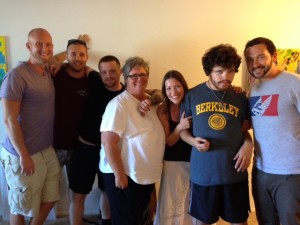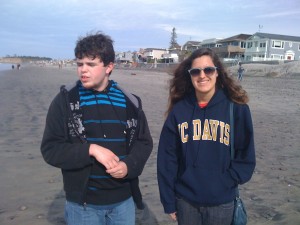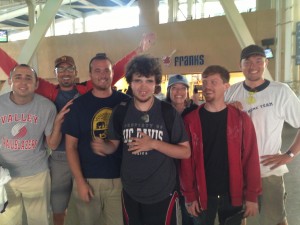
Jeremy (a bit overwhelmed with so many people invading his space at the same time) and part of Team Jeremy.
Jeremy is moving into his own place. Months ago, when we found out that Jeremy received the approval and supports (from the powers that be) to make Jeremy’s dream a reality, I enthusiastically stated in an AutismCollege blogpost that Jeremy and I would be blogging about the process of preparing for this major transition – in the hopes that some of the information would be useful to others.
As John Lennon once wrote, “Life is what happens to you while you’re busy making other plans.” Here it is, almost six months later, and we’ve had no time to write. I’ve moved over fourteen times since I was a baby, so I’m no newbie when it comes to moving into a new home. But for Jeremy, moving meant more than just transferring to another living space. In the book, A Full Life with Autism, Jeremy and I described some of the preparation that has been ongoing for years. Here’s what the last six months have entailed:
- Learning to be more independent in certain home skills: Learning physical tasks is challenging for Jeremy due to his visual processing and motor skills. Practicing in a familiar environment helps before transferring the skill to a new environment. We have to break down tasks into simple steps.
- Learning what it means to be a good housemate: As soon as Jeremy knew that his dream was coming true of having his own place shared with another person; he wanted to know what it meant to be a good roommate. He asked a young man he knows at his volunteer job to have breakfast with him so he could ask him what to look for in a roommate, and how to be a good roommate. He had heard this man talk about his roommates, so he figured he might have advice. Then, Jeremy wrote some simple rules for himself to follow, ie “The first rule is that I need to do my dishes when I make food.”
- Finding the right apartment in the right neighborhood: Jeremy has always wanted to live in the neighborhood he grew up in because everyone knows him. When he goes out shopping, or walking the dog or to the beach, people stop and talk to him. That’s important to him.
- Finding the right housemate: Jeremy needed to find someone who would share the apartment with him (each have there own bedroom and bathroom). Jeremy needs 24 hour supports, and the apartment-mate would be responsible for being there most nights. LifeWorks (the company that was vendored to provide supports and supervision to make all this possible) found Jeremy’s housemate.
- Finding the right staff: We are lucky in that we have wonderful support staff that have been with Jeremy for years, but we needed more people to fill all the hours on the schedule, and LifeWorks found people that were a good addition to the existing Team Jeremy.
- Staff training: Because of Jeremy’s communication challenges, training was and continues to be a high priority. New ‘Team Jeremy’ members receive a certain amount of training so that they- and Jeremy -can feel comfortable and safe as they go about their day.
- Preparing the apartment: Having the apartment as functional as possible for Jeremy helps him be more independent. Where everything is placed in the cupboards, how everything is organized is what makes him successful in completing tasks. Think about how someone with limited visual skills and limited motors skills needs to be able find and get what he needs for everyday life – that’s what Jeremy needs to be as independent as possible.
- Having his sister Rebecca’s advice on his décor: Jeremy was very clear as to what he wanted in the apartment (very little) the colors he wanted (solid, no patterns and lots of green) and what he wanted to hang on the walls (a few paintings representing calmness, friendship, love). But he wanted his sister- whom he has helped move away to college and into different living situations there- to help him find the furniture needed in the living room and to help him with figuring out where to hang his chosen paintings and posters.
- Earning the money to pay for his rent: Jeremy is responsible for his share of the rent, and he wants to earn money from his painting. Mom is helping with the marketing at the moment (anyone want a painting, prints or cards? Contact me!).
There is undoubtedly much more to add to this list, but this is a good start. At time of writing, September 1st is the official date for Jeremy’s full-time move to his apartment. Just like Jeremy learning the skill of pointing to letters to communicate, being ready to move out away from his parents did not happen overnight. He has been preparing for this transition for many years (read A Full Life with Autism). It’s a process, and it is still ongoing. There are sure to be bumps in the road, but that’s life. We feel grateful that wonderful Team Jeremy and LifeWorks are here to support him as he takes the first steps of living his dream.



